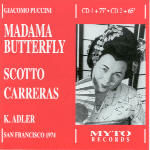Butterfly was one of Renata Scotto’s great roles; she recorded it commercially twice and performed it often on stage. It could be argued that her voice is a size too small for the part (and that singing roles too big for her added to her vocal decline), but Toti dal Monte, an even lighter coloratura, sang it too, and of the two, Scotto is the more credible, wonderful, comfortable, and closer to Puccini. In fact, she’s in a class with Callas and Freni (both very different but both fantastic), and this performance, captured live in San Francisco in 1974, may just be the most vivid and touching reading of the role ever released on CD.
Scotto’s splendid vocal health at the time allows her to wring every ounce of feeling from this saddest of all Puccini’s heroines. She “girlifies” her tone in the early episodes, whitens it when the character is emotionally drained and resigned, lashes into chest voice when angry, and sings with a type of forceful resolve in her quiet confrontation with Kate Pinkerton (and her own fate) in the opera’s last act. And her innate sense of rubato allows “Un bel di” to be taken very slowly but to remain totally involving, with every word and feeling nuanced without being exaggerated. The opera’s emotional climax–when Butterfly spots the ship and thinks that Pinkerton has returned and that he loves her–is precisely as huge as it should be. If singing this passionately and stretching the voice to its limit like this took a year or two off her peak, well, we’re the richer for it.
José Carreras, near the start of his career, is similarly perfect, singing with a voice perhaps more beautiful than any heard before or since and with absolute commitment and abandon. The rest of the cast is good. Kurt Adler normally was not the most insightful or fascinating conductor, but perhaps inspired by his cast he serves Puccini gloriously. The orchestra plays with accuracy, depth of feeling, and passion usually found only at fancy music festivals. This is a knockout–it alone could convince the doubtful of Scotto’s importance in the world of opera in the second half of the 20th century.
































